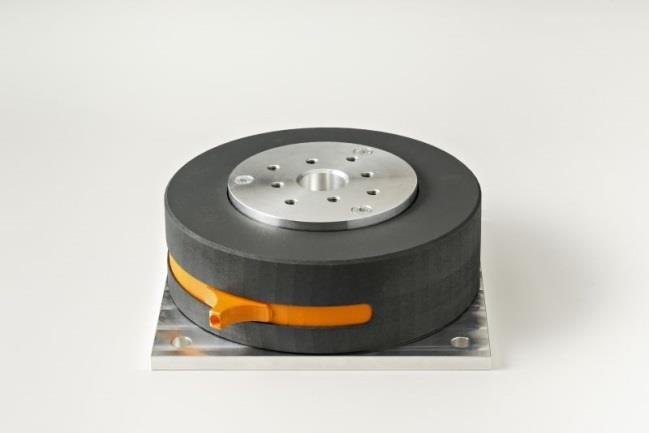The research team from Darmstadt developed tunable components and a mechanical hardware-in-the-loop interface. Tunable components allow continuous adjustment of mechanical characteristics. For example, mounts with tunable stiffness enable testing of a test specimen under different boundary conditions or the implementation of tunable vibration absorbers.
If tunable rubber mounts are used as a development tool, with stiffness and damping adjustable independently of each other, it is possible to forgo the first bearing prototypes. This makes it possible to provide the mount manufacturer with optimized specifications at an early stage of development. Mechanical hardware-in-the-loop interfaces can be used to simulate more complex boundary conditions in experiments, especially in the field of NVH development. The interface behaves equivalent to a underlying numerical model in a wide frequency range. For example, an adaptive shock absorber can be tested for different combinations of top mount and chassis without carring out any modifications to the testing bench.
»The transfer of numerical simulation methods into the physical world of testing makes it possible for development processes to be drastically accelerated and costs to be reduced. Furthermore, our technologies and test rig components offer new possibilities for validation of numerical simulation models. Models can be validated for different operating points with less effort«, says Jan Hansmann, research associate and project manager at the Fraunhofer LBF. Next, the research team from Darmstadt wants to work on the series-production implementation, which requires close cooperation with industrial partners.
Fraunhofer LBF in Darmstadt has stood for the safety and reliability of lightweight structures for more than 80 years. Today, with its expertise in the areas of structural durability, system reliability, vibration technology and polymer technology, the Institute provides solutions for three of the most important cross-cutting issues of the future: lightweight design, functional integration and cyberphysical mechanical engineering systems. The focus here is on solutions to social challenges such as resource efficiency and emission reduction as well as future mobility, like e-mobility and autonomous, networked driving. Comprehensive skills ranging from data acquisition in real operational field use to data analysis and data interpretation, in addition to deriving specific measures to design and improve material, component and system properties form the basis for this. Customers come from automotive and commercial vehicle construction, railway transport engineering, shipbuilding, aviation, machine and plant construction, power engineering, electrical engineering, medical engineering and the chemical industry. They benefit from the proven expertise of over 400 employees and cutting-edge technology accommodated in more than 11,560 square meters of laboratory and experimental space.
Fraunhofer Institut LBF
Bartningstr. 47
64289 Darmstadt
Telefon: +49 (6151) 705-287
http://www.fraunhofer.de
PR-Agentur Dr. Klaus Heidler Solar Consulting, Solar Info Center
Telefon: +49 (761) 380968-27
Fax: +49 (761) 380968-11
E-Mail: steinchen@solar-consulting.de
Presse und Öffentlichkeitsarbeit
Telefon: +49 (6151) 705-268
Fax: +49 (6151) 705-214
E-Mail: anke.zeidler-finsel@lbf.fraunhofer.de
Telefon: +49 (6151) 705-8366
E-Mail: jan.hansmann@lbf.fraunhofer.de
